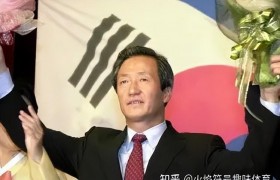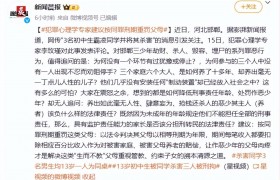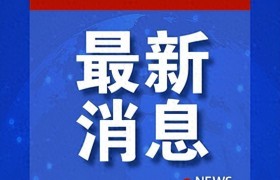围绕中国和韩国文化之争,其实不止国内,海外网友也是争得不可开交。在海外问答论坛上,就有网友发起提问:“中韩之间,谁在窃取谁的文化?”我们现在就一起来看看海外网友的观点吧。


海外网友伊丽莎白的回答
Well, since China and South Korea are neighbors, they’re bound to influence each other. Influence goes both ways but it’s pretty clear that China has been the cultural center of the Korean peninsula during the past 1000 years. The influence waned when China became weak during the late 19th and the entire 20th century.
那么,中韩两国是邻国,必然会相互影响。影响是双向的,但很明显,在过去的 1000 年里,中国一直是朝鲜半岛的文化中心。当中国在 19 世纪后期和整个 20 世纪变得虚弱时,这种影响就减弱了。
What I find interesting is that China never had disputes with Japan on topics about culture. For instance, the Japanese almost always credit China for being the origin of certain cultural trends, and the Chinese credit Japan for making the trends popular.
我觉得有意思的是,中国和日本从来没有在文化话题上发生过争执。例如,日本人几乎总是认为中国是某些文化趋势的发源地,而中国人则认为日本使这些趋势流行起来。
However, when discussing culture with South Korea, the conversation always spiral out of control into flame wars. Why? I figure that South Koreans are extremely insecure about their own culture since it was heavily damaged during the 35 years of Japanese occupation. Many Korean documents and cultural artifacts were destroyed or stolen. South Korea lacked the funds to recover and study its own history until recently. The process of revitalizing traditions in combination with the latest popularity of Kpop and consumer products gave South Koreans a sense of confidence and superiority. Perhaps exceedingly so. Frankly, who can blame them?
然而,在与韩国讨论文化时,谈话总是失控演变成口水战。为什么?我认为韩国人对自己的文化极度没有安全感,因为它在日本占领的 35 年中遭到严重破坏。许多韩国文件和文物被毁或被盗。直到最近,韩国还缺乏恢复和研究本国历史的资金。复兴传统的过程与 Kpop 和消费品的最新流行相结合,给了韩国人一种自信和优越感。也许的确如此。坦率地说,谁能责怪他们呢?
The rise of South Korea also coincides with the rise of China. And what do the nationalistic netizens excel at? Flame wars of course. South Koreans are also emboldened by the Anti-China propaganda and unconditional full support by the western audience on western platforms. This isn’t a matter of right or wrong anymore, South Koreans are only opportunistic. The sentiment couldn’t be more evident than in the winter Olympics, where the Chinese athletes get accused of cheating despite the videos of fouls by South Korean and Hungarian skaters were presented in 4K resolution. Never seen those clips being shared on Reddit or Twitter by anyone other than the Chinese. Well, that’s the life I guess.
韩国的崛起也与中国的崛起不谋而合。民族主义网民擅长什么?当然是火焰大战。西方观众在西方平台上的反华宣传和无条件全力支持也鼓舞了韩国人。这已经不是对错的问题了,韩国人只是投机取巧。这种情绪在冬奥会上表现得最为明显,尽管韩国和匈牙利滑冰运动员犯规的视频以 4K 分辨率呈现,但中国运动员仍被指控作弊。从未见过除中国人以外的任何人在 Reddit 或 Twitter 上分享这些片段。好吧,这就是生活。
Returning to the original topic, no, the Chinese don’t need to steal culture from Korea as China has tons of documented and archeological evidence. South Koreans on the other hand…let’s say that they have interesting professors.
回到最初的话题,不,中国人不需要从韩国窃取文化,因为中国有大量的文献和考古证据。另一方面,韩国人……可以说他们有有趣的教授。(老哥,你这个嘲讽也挺绝的)

海外网友米娅·布朗的回答
“No man is an island” is a phrase we often use to describe the importance of communication.The Chinese culture is not only unique but also open and inclusive.Chinese culture is not isolated. We cannot turn a blind eye to or deny the existence of other cultures. And we also cannot deny the historical traditions and achievements of Chinese culture. All human civilizations are equal in value, and there is no distinction between superior and inferior. But there are groups and people in South Korea who may have misunderstood the meaning of “communication.” They always claim that some cultural customs imported from China originated from Korea. They may just be used to some of the customs that originated in China.
“没有人是一座孤岛”是我们经常用来形容交流重要性的一句话。中国文化不仅是独一无二的,而且是开放包容的。中国文化不是孤立的。我们不能对其他文化的存在视而不见,也不能否认。我们也不能否定中华文化的历史传统和成就。人类文明一律平等,没有优劣之分。但韩国有些团体和人可能误解了“交流”的含义。他们总是声称从中国输入的一些文化习俗起源于韩国。他们可能只是习惯了一些起源于中国的习俗。
First of all, the most basic fact is that, as one of the four ancient civilizations, China has a long history of more than 5,000 years, and has created its own unique brilliant Chinese civilization and traditional culture. And it is a matter of pride that their ancestors recorded what happened in Chinese history and left them to future generations. Oracle-bone script, bronze inscriptions, bamboo inscriptions, silk embroidery, poetry, painting and calligraphy, printed books and so on all provide traces and pictures of the Chinese culture. Many folk skills have been passed down from generation to generation. So Chinese people have full confidence in their own culture.
首先,一个最基本的事实是,作为四大文明古国之一,中国拥有5000多年的悠久历史,创造了独具特色的灿烂中华文明和传统文化。而他们的祖先把中国历史上发生的事情记录下来,留给后人,更是一件值得骄傲的事情。甲骨文、金文、竹文、丝绸刺绣、诗歌、书画、印刷书籍等,无一不提供着中华文化的踪迹和图画。许多民间技艺代代相传。所以中国人对自己的文化充满信心。

The latest cultural dispute between China and South Korea is over kimchi. Famous vlogger Li Ziqi made a “Paocai”(Kimchi is called “Paocai” in China) in her video. After she posted the video, some South Korean netizens left comments claiming that kimchi is a traditional Korean food. China and South Korea netizens are in dispute over the ownership of kimchi. About the history of “Paocai”, according to relevant records, there is a written history of making “Paocai” in Meishan, Sichuan Province, which can be traced back to over 1,500 years ago.
中韩之间最新的文化争端是泡菜。著名vlogger李子柒在她的视频中做了一个“泡菜”(泡菜在中国被称为“泡菜”)。在她发布视频后,一些韩国网友留言称泡菜是韩国的传统食品。中韩网友就泡菜的归属问题争论不休。关于“泡菜”的历史,据有关记载,四川省眉山地区就有制作“泡菜”的文字记载,距今已有1500多年的历史。

Su Dongpo, a famous Chinese poet, not only liked to eat “Paocai”, but also made it in person. ”Paocai” is made in many parts of China, and the tastes of “Paocai” are different from place to place with its own characteristics.
中国著名诗人苏东坡不仅喜欢吃“泡菜”,而且亲自制作。“泡菜”在中国很多地方都有制作,“泡菜”的口味因地而异,各有特色。

Well,only one or two types of Sichuan “Paocai” are shown in Li Ziqi’s video, which features a wide variety of “Paocai” in China. Kimichi may have become an inherent image of South Korea, leading many netizens to believe that kimchi is unique to South Korea. Chinese kimchi is not famous because although the Chinese like to eat kimchi, it is only served as an appetizer and is not intended to serve guests.
那么,李子柒的视频中只展示了一两种四川“泡菜”,它展示了中国各种各样的“泡菜”。泡菜可能已经成为韩国的固有形象,导致很多网友认为泡菜是韩国独有的。中国泡菜并不出名,因为虽然中国人喜欢吃泡菜,但它只是作为开胃菜,并不是用来招待客人的。

Culture is not supposed to talk about stealing, it’s about communication and integration. Just like kimchi, there’s no point in insisting that it originated in Korea, because history has given us the answer. It’s clear that kimchi is just a food with different local flavors.
文化不应该讲偷窃,而是讲交流和融合。就像泡菜一样,坚持说它起源于韩国是没有意义的,因为历史已经给了我们答案。很明显,泡菜只是一种具有不同地方风味的食物。

这位老哥明显是国人
Have you ever heard of a Canadian food, poutine? A mixture of french fries, cheese and gravy. Chinese culture owns fries, cheese and gravy. Koreans mix them and give it a new name — poutine. Now you understand?
你有没有听说过加拿大的食物poutine吗?它是一种炸薯条、奶酪和肉汁的混合物。中国文化就像拥有薯条、奶酪和肉汁。韩国人将它们混合在一起,并给它起了一个新名字——poutine。你现在明白了吗?
看完这些外国网友的回答,大家有什么想法都可以留言评论哦!









